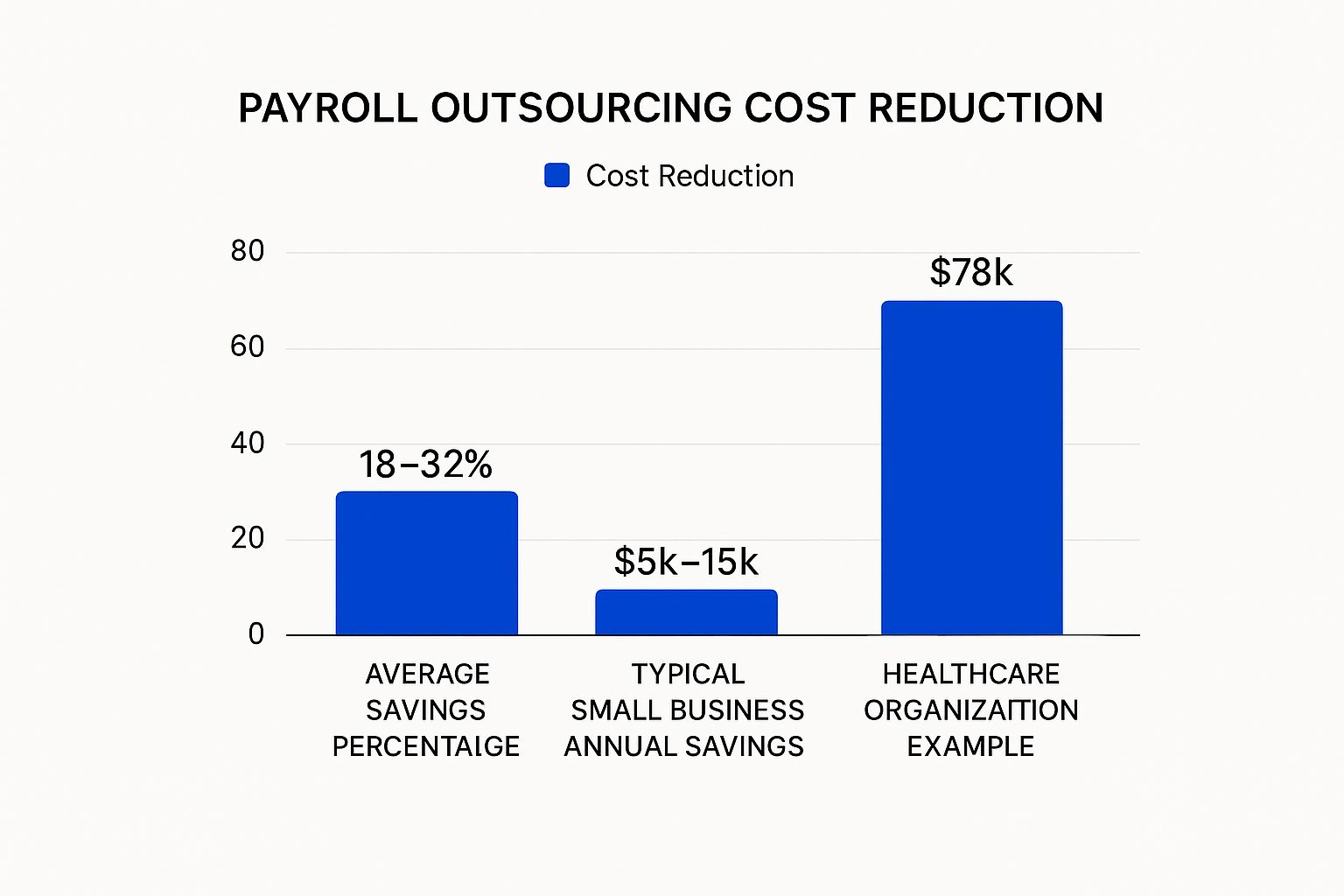Managing payroll is a critical but time-consuming function that pulls focus from core business activities. For small and medium-sized enterprises (SMEs), HR managers, and finance teams, the administrative burden of calculating wages, withholding taxes, and ensuring regulatory compliance can become a significant bottleneck to progress. The slightest error can lead to costly penalties and, more importantly, damage employee morale and trust. The solution for many growing businesses is strategic payroll outsourcing.
This decision is no longer just about offloading a task; it's about leveraging expert knowledge, advanced technology, and streamlined processes to boost overall business health. By partnering with a specialist, companies can enhance efficiency, mitigate compliance risks, and free up valuable internal resources to concentrate on strategic growth initiatives. For a detailed look into how outsourcing can transform your business, including cost reduction and compliance, explore the 7 Key Benefits of Outsourcing Payroll for UK SMEs.
This article will break down the eight most transformative benefits of payroll outsourcing, offering actionable insights for each. We will explore how this strategic move can redefine your business operations, save you money, and provide a stable foundation for future expansion.
1. Cost Reduction and Predictable Expenses
One of the most immediate and significant benefits of payroll outsourcing is the substantial reduction in operational costs. Managing payroll in-house requires a significant investment in dedicated staff, expensive software licences, and continuous training to keep up with changing regulations. These direct and indirect expenses accumulate, creating a considerable financial burden, especially for small and medium-sized enterprises (SMEs).
By outsourcing, you eliminate these overheads. Instead of paying salaries, benefits, and national insurance contributions for a full-time payroll administrator, you pay a predictable, recurring fee to a specialised provider. This model transforms a variable, often unpredictable internal cost into a fixed, manageable operational expense. Companies typically report saving between 18% and 32% on their total payroll processing costs compared to keeping it in-house.
Real-World Savings in Action
The financial impact becomes clearer when looking at specific examples. A small business with 10-50 employees can save between £4,000 and £12,000 annually. A mid-sized company might see its payroll department costs shrink by 25%. In one documented case, a healthcare organisation with 300 employees saved £62,000 yearly by removing two full-time payroll positions and associated software costs.
This bar chart visualises the direct financial impact, comparing average savings with tangible business examples.

The chart clearly illustrates how outsourcing translates broad percentage savings into substantial, real-world financial gains for businesses of different sizes.
Actionable Tips for Maximising Your Savings
To ensure you get the best value, approach your decision strategically. Follow these steps to maximise the financial benefits:
- Analyse All-Inclusive vs. A La Carte Pricing: Some providers offer a single fee covering all services, while others charge for each item separately (e.g., year-end reporting, new hire setup). Compare models to see which is more cost-effective for your needs.
- Calculate the Total Cost of Ownership (TCO): Your internal costs aren't just salaries. Factor in hidden expenses like printing payslips, postage, and the time your team spends resolving errors.
- Factor in Error Reduction: A key benefit of payroll outsourcing is accuracy. Calculate the potential savings from avoiding costly penalties from HMRC due to late or incorrect filings.
By shifting from a fixed in-house cost centre to a variable, expert-led service, you not only save money but also unlock strategic financial flexibility. For a deeper look into optimising your financial operations, explore our guide on finance and accounting outsourcing.
2. Enhanced Compliance and Risk Mitigation
A primary benefit of payroll outsourcing is the enhanced compliance and risk mitigation it provides, mirroring the advantages of comprehensive top compliance management solutions for your business. Payroll compliance is a minefield of constantly changing regulations from HM Revenue and Customs (HMRC), alongside complex labour and pension laws. Maintaining this expertise in-house is a significant and costly challenge.
Professional payroll providers specialise in navigating this environment. They employ teams of experts dedicated to staying current with tax law updates, National Minimum Wage adjustments, and reporting requirements. This shields your business from the substantial risk of costly penalties, audits, and legal disputes stemming from non-compliance. Instead of hoping your internal team catches every change, you gain expert-level protection.
Real-World Compliance in Action
The value of this expertise becomes tangible when facing regulatory hurdles. For instance, a UK retail chain with multi-site operations maintained 100% tax filing accuracy across different regional pay scales. In another case, a construction firm drastically reduced its audit discrepancies related to the Construction Industry Scheme (CIS) by relying on their provider's automated and accurate classifications.
These examples show how specialised knowledge prevents costly errors. A manufacturing company avoided significant penalties related to auto-enrolment pension regulations by using a provider’s monitoring services, saving them thousands in potential fines and administrative headaches.
Actionable Tips for Maximising Your Compliance
To ensure you are fully protected, vet potential providers with a focus on their compliance capabilities. Follow these steps to mitigate risk effectively:
- Verify Tax Penalty Guarantees: Ask if the provider offers a guarantee to cover any penalties incurred due to their errors. This demonstrates confidence in their accuracy.
- Request Compliance Certifications: Look for recognised accreditations like ISO 27001 for information security or other industry-specific certifications that validate their processes.
- Establish Clear Communication Protocols: Ensure there is a defined process for how the provider will inform you of regulatory changes that affect your business and how they will be implemented.
- Review Their Audit Support: Enquire about their process for supporting you during an HMRC audit. A good provider will have robust procedures and historical data ready to assist.
By outsourcing, you transform a major internal risk into a managed, expert-led service. To weigh the pros and cons further, review our detailed guide on the advantages and disadvantages of outsourcing.
3. Time Savings and Increased Productivity
One of the most valuable benefits of payroll outsourcing is the significant recovery of time, which directly fuels organisational productivity. Managing payroll in-house is a notoriously time-consuming process, with small businesses often dedicating between five and ten hours per pay period to this single task. This administrative burden scales with company size, consuming valuable resources that could otherwise be invested in core business functions.
By entrusting payroll to an external specialist, you reclaim these hours. This allows key personnel, from HR managers to business owners, to pivot their focus from administrative minutiae to strategic, revenue-generating activities. Studies from sources like the Small Business Administration highlight that businesses can recover an average of 18 hours per month in administrative time, a substantial gain that can be redirected toward growth, employee development, and enhancing customer service.

Real-World Productivity Gains in Action
The impact on business operations becomes clear through tangible examples. A regional restaurant chain freed up 40 hours monthly, enabling its HR manager to design and implement a new, urgently needed employee training programme. Similarly, a professional services firm redirected the time saved towards talent acquisition, successfully reducing its average time-to-hire by 30%. In another case, a non-profit organisation reduced its payroll processing time from 12 hours down to just two, allowing staff to focus more on its mission-critical work.
This strategic reallocation of time is where the true value lies. It's not just about doing less administrative work; it's about creating the capacity to do more of the work that drives the business forward.
Actionable Tips for Maximising Your Time Savings
To ensure you fully capitalise on this newfound efficiency, a strategic approach is essential. Follow these steps to maximise the productivity benefits:
- Track Your Time Pre-Outsourcing: For three months before making the switch, meticulously track the hours your team spends on payroll tasks. This provides a clear baseline to measure your return on investment.
- Implement Employee Self-Service: Choose a provider that offers an employee self-service portal. This empowers staff to manage their own details and access payslips, drastically reducing HR queries.
- Create Standardised Data Submission Processes: Work with your provider to establish a clear, simple, and repeatable process for submitting payroll data each period. This minimises back-and-forth communication.
- Use Saved Time Strategically: Proactively plan how you will reallocate the recovered hours. Assign this time to high-value activities like strategic planning, client relations, or staff development.
By offloading the tactical burden of payroll, you empower your team to focus on strategic initiatives. For more guidance on optimising your team's focus, explore our detailed guide on how to delegate tasks effectively.
4. Access to Advanced Technology and Innovation
Developing or purchasing enterprise-level payroll technology is prohibitively expensive for most businesses. Payroll providers, however, invest millions in cutting-edge systems, artificial intelligence (AI), and mobile platforms. Outsourcing gives your business immediate access to these sophisticated tools, levelling the playing field and allowing you to operate with technology comparable to a Fortune 500 company.
This technology advantage streamlines operations by offering features like predictive analytics, real-time reporting, and seamless integrations with your existing HR and accounting software. It transforms payroll from a simple administrative function into a source of valuable business intelligence, one of the key benefits of payroll outsourcing.

Real-World Technology in Action
The impact of this advanced technology is tangible. A manufacturing firm connected biometric time clocks to its outsourced payroll system, eliminating time theft and saving £45,000 annually. Similarly, a hospitality group used its provider’s mobile platform to reduce new hire onboarding time from three days to just four hours. In another case, a distribution company integrated its warehouse management system with payroll, cutting data entry errors by 85%.
These examples show how modern payroll platforms, pioneered by companies like Workday and Rippling, deliver powerful, practical efficiencies that drive real business growth.
Actionable Tips for Leveraging Technology
To ensure you harness the full power of a provider’s technology stack, focus on these strategic steps during your evaluation:
- Prioritise Open API Architecture: Choose providers with flexible integration capabilities to ensure the system can connect with your current and future software tools.
- Test Mobile Functionality: With over 80% of employees now preferring mobile access for HR tasks, thoroughly test the provider's mobile app during any trial period.
- Verify System Compatibility: Before committing, confirm that the platform integrates seamlessly with your existing accounting, HRIS, and time-tracking systems to avoid data silos.
- Ask About the Technology Roadmap: Enquire about their update frequency and schedule for rolling out new features. This helps you partner with a provider committed to innovation.
5. Scalability and Business Growth Support
One of the most strategic benefits of payroll outsourcing is its inherent ability to support and facilitate business growth. As a company expands, payroll complexity increases exponentially. Managing more employees, diverse pay structures, multiple locations, and varying regulations can quickly overwhelm an in-house team, creating a significant bottleneck to growth.
Outsourcing transforms payroll from a rigid internal function into a flexible, scalable service. A specialised provider can seamlessly manage your payroll whether you have 10 employees or 1,000, without requiring you to invest in new software, hire additional staff, or overhaul your infrastructure. This elasticity is crucial during rapid expansion, seasonal peaks, or even market contractions, allowing your business to adapt swiftly.
Real-World Scalability in Action
The value of this flexibility becomes clear in dynamic business scenarios. For instance, an e-commerce startup scaled from 15 to 300 employees in 18 months without ever changing its payroll system. Similarly, a seasonal resort effortlessly manages payroll for 100 core staff in winter and over 600 during the summer peak, thanks to its flexible outsourced solution.
In the corporate world, a private equity firm successfully integrated five newly acquired companies onto a single, unified payroll platform within six months, a task that would have been a logistical nightmare for an internal team. This demonstrates how outsourcing provides the agility needed to capitalise on growth opportunities without being constrained by administrative limitations.
Actionable Tips for Ensuring Scalability
To ensure your chosen provider can grow with you, consider the following strategic steps:
- Verify Multi-Jurisdictional Support: If you plan to expand nationally or internationally, confirm the provider can handle payroll and tax compliance in all your target regions or countries.
- Analyse Tiered Pricing Structures: Review how the provider's fees will change as your employee count grows. Ensure the pricing remains economical and predictable at your projected growth levels to avoid future financial surprises.
- Request Relevant Case Studies: Ask for examples of clients in your industry who have experienced significant growth. This provides proof of the provider's ability to handle the scaling process effectively.
- Discuss M&A Integration: If mergers and acquisitions are part of your strategy, ask specifically about their experience and services for integrating new employee groups onto your existing platform.
By choosing a partner equipped for growth, you ensure that your payroll function acts as an enabler, not a barrier, to your company’s expansion.
6. Enhanced Data Security and Business Continuity
Payroll data is a treasure trove of sensitive information, including addresses, bank details, and National Insurance numbers. This makes it a high-value target for cybercriminals, placing an immense security burden on any business that processes payroll in-house. Outsourcing this function transfers that risk to a specialist provider equipped with enterprise-grade security infrastructure.
Professional payroll firms invest heavily in measures that are often prohibitively expensive for individual businesses. These include multi-layered data encryption, robust firewalls, regular security audits, and dedicated cybersecurity teams. This transforms data security from a significant internal risk and expense into a built-in feature of your outsourced service, providing peace of mind and demonstrating due diligence in protecting employee data.
Real-World Security in Action
The protection offered by a dedicated provider becomes critical during a crisis. For example, a UK-based manufacturing company continued to pay its staff on time despite a ransomware attack that crippled its internal IT systems, because its payroll was managed on a separate, secure platform. Similarly, a financial services firm met its strict regulatory requirements by leveraging its provider's SOC 2 certification, avoiding the high cost and complexity of achieving it independently.
In another instance, a retail business whose head office was destroyed in a fire recovered its payroll function within four hours. The provider’s cloud-based system and established disaster recovery protocols ensured business continuity was maintained with minimal disruption, a feat that would have been nearly impossible with an on-premise solution.
Actionable Tips for Maximising Your Security
To ensure your chosen provider meets the highest security standards, use this checklist during your evaluation:
- Verify Certifications: Ask for proof of security certifications like SOC 2 Type II or ISO 27001, which validate their security controls through independent audits.
- Confirm Encryption Standards: Ensure the provider uses strong encryption for data both "at rest" (stored on servers) and "in transit" (sent over the internet).
- Question Disaster Recovery Protocols: Ask about their Recovery Time Objective (RTO) and Recovery Point Objective (RPO) to understand how quickly they can restore service after an incident.
- Review Data Policies: Clarify policies on data ownership, portability, and their procedures for securely deleting your data if you terminate the contract.
By entrusting your payroll to a provider with a robust security posture, you are not just outsourcing a task; you are investing in a critical layer of protection for your business and your employees.
7. Improved Accuracy and Error Reduction
Payroll errors are more than just a nuisance; they are costly, time-consuming, and can severely damage employee morale. In-house payroll, especially when managed manually, is prone to miscalculations, incorrect tax deductions, and missed deadlines, with typical error rates ranging from 20-40%. These mistakes can lead to significant penalties from HMRC and erode the trust your employees have in the business.
Outsourcing this function is one of the key benefits of payroll outsourcing, as it introduces a level of precision that is difficult to replicate internally. Professional providers leverage sophisticated, automated systems and expert review processes to achieve accuracy rates exceeding 99.5%. These platforms have built-in validation checks that eliminate common manual errors, ensure correct tax and National Insurance contributions are withheld, and flag anomalies before the payroll run is finalised.

Real-World Accuracy in Action
The impact of enhanced accuracy is immediate and measurable. A UK-based construction company, for instance, eliminated £28,000 in annual tax penalties after outsourcing its payroll. Similarly, a healthcare provider reduced its payroll correction rate from 15% to just 0.5% per pay run, freeing up valuable HR time. In another case, a manufacturing business recovered £42,000 in overpaid unemployment taxes that were identified by their new payroll provider during an initial audit.
Actionable Tips for Maximising Accuracy
To ensure you achieve the highest level of precision from your payroll partner, a proactive approach is essential. Use these tips to minimise errors from the start:
- Request Guarantees: Ask potential providers for their accuracy guarantees and error correction policies in writing before signing a contract.
- Run Parallel Payroll: When transitioning, run your old in-house system alongside the new outsourced service for two or three pay cycles to verify accuracy and resolve discrepancies.
- Integrate Your Data: Use data integration between your HR and payroll systems to reduce the manual data entry that often causes errors at the source.
- Establish Clear Checkpoints: Implement internal validation checkpoints for your data (e.g., new hires, salary changes) before submitting it to your provider each pay period.
By leveraging the expertise and technology of a dedicated provider, you can transform payroll from a high-risk function into a seamless, reliable, and accurate business process. This strategic move not only prevents financial loss but also strengthens your reputation as a dependable employer.
8. Expert Support and Dedicated Account Management
Payroll involves complex calculations, constantly changing regulations, and unique scenarios that require specialised expertise. One of the most valuable benefits of payroll outsourcing is gaining direct access to a team of certified professionals, tax experts, and compliance specialists who understand the intricate details of payroll law and practice. This external expertise removes the immense pressure on your internal team to become payroll experts overnight.
Instead of navigating complex legislation or ambiguous tax questions alone, you have a dedicated account manager or support team just a phone call or email away. This provides peace of mind that any issues, from statutory pay calculations to year-end reporting, are handled correctly and efficiently. This direct line to expert guidance transforms payroll from a source of internal stress into a seamlessly managed function.
Real-World Expertise in Action
The value of this specialised support becomes most apparent in complex situations. For instance, a UK startup navigated the complex taxation rules for employee stock options with their provider’s equity compensation specialist, ensuring full compliance. Another example involves a multi-site retail business that received guidance on varying local employment laws, preventing thousands in potential penalties for incorrect wage calculations.
Similarly, a non-profit organisation successfully processed intricate grant-funded payroll allocations with their provider's expert consultation. These scenarios highlight how access to on-demand expertise can prevent costly errors and save countless hours of internal research and administrative work.
Actionable Tips for Maximising Your Support
To ensure you receive the high-quality support you need, it's crucial to vet providers carefully. Follow these steps to get the most from your partnership:
- Clarify Support Availability: Before signing a contract, confirm the provider’s support hours, typical response times, and the procedures for escalating urgent issues.
- Verify Staff Credentials: Ask about the qualifications of their support staff. Look for accreditations from organisations like the Chartered Institute of Payroll Professionals (CIPP).
- Test Responsiveness: During a demo or trial period, test the support team’s responsiveness and the quality of their answers to a few sample questions.
- Understand Service Inclusions: Determine which support services are included in your package versus those that come at an additional cost, such as audit defence or specialised consultations.
By partnering with a provider that offers robust, expert-led support, you gain more than just a processing service; you gain a strategic partner dedicated to your company's financial accuracy and compliance.
Benefits Comparison Matrix of Payroll Outsourcing
Integrating Payroll Outsourcing with Global Talent
The journey through the core benefits of payroll outsourcing reveals a clear narrative: strategic delegation empowers growth. From dramatic cost reductions and predictable budgeting to fortified compliance and mitigated risks, the advantages are compelling. By handing over complex payroll functions to dedicated experts, your business reclaims invaluable resources, namely time and focus, which can be redirected towards core operational goals and innovation.
We've explored how outsourcing enhances data security, ensures pinpoint accuracy, and provides access to cutting-edge technology without the burdensome capital investment. This isn't just about offloading a task; it's about upgrading a critical business function, making it more efficient, secure, and scalable.
From Administrative Efficiency to Strategic Growth
Mastering this concept means shifting your perspective on outsourcing from a simple cost-saving measure to a fundamental pillar of your growth strategy. The real power is unleashed when you combine administrative efficiency with a modern approach to talent acquisition. The same logic that makes outsourcing payroll so effective, saving money while accessing expertise, applies directly to building your team.
This is where the model truly transforms. By integrating the efficiency of a managed payroll service with a global remote staffing solution, you create a powerful, symbiotic relationship.
Key Takeaway: The ultimate advantage lies in synergy. Pair the administrative relief of outsourced payroll with the strategic talent acquisition of a global remote workforce to build a lean, powerful, and scalable business engine.
Actionable Next Steps: Building Your Global Team
Ready to translate these benefits into tangible results? Here is a practical path forward:
- Audit Your Current Processes: Begin by calculating the true cost of your in-house payroll. Factor in salaries, software subscriptions, training, and the hours your team spends on administrative tasks instead of revenue-generating activities.
- Explore Payroll Partners: Research reputable payroll outsourcing providers that specialise in serving businesses of your size and industry. Look for transparent pricing, robust security protocols, and excellent client support.
- Rethink Your Talent Strategy: Simultaneously, consider which roles within your organisation could be filled by elite global talent. Companies like Beyond Hire offer a streamlined, risk-free way to connect with the top 1% of remote professionals in talent-rich regions like South Africa, often at a significant cost saving.
- Create a Dual-Outsourcing Plan: Develop a strategy that leverages both services. Your outsourced payroll provider can manage the complexities of paying your team, while your remote staffing partner handles recruitment, vetting, and onboarding. This creates a seamless, end-to-end solution for building and managing a world-class team.
By embracing this dual-outsourcing framework, you are not just optimising a single department; you are fundamentally redesigning your business for agility, resilience, and global competitiveness. The efficiency gains from outsourcing payroll provide the financial and operational runway to invest in top-tier global talent, creating a virtuous cycle of growth and success. This integrated approach is no longer a future concept; it's the accessible, intelligent way to build the business of tomorrow, today.

